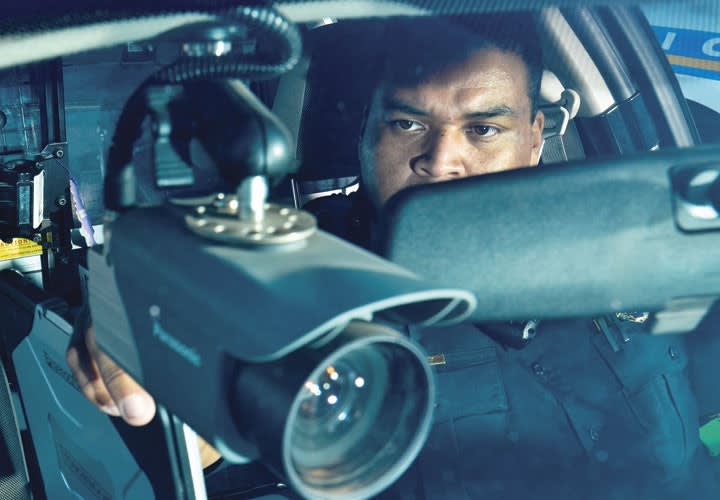Technology has not been without its understated dangers, particularly for millennial-generation officers. These men and women who are currently entering the law enforcement workforce are finding that advancements in the tech arena come with a price, often saddling them with distractions to their situational awareness and officer safety.
Hardly a day goes by when the news, the blogs, and social media sites are not abuzz with talk about the latest new technology. Virtually simultaneous to the announcement of the latest form of wizardry, someone will ask what application the technology—such as the Navy's new rail gun or that First Amendment nullifier out of Japan, the SpeechJammer—might have for law enforcement.
And for good reason.
While new technologies have rarely been developed specifically for use in law enforcement, the application of these technologies has helped to expedite and streamline many aspects of our profession, providing us with faster and more efficient ways of producing, accessing, and processing reports, crime analysis, and forensics. In the early 20th century, automobiles broadened the reach of law enforcement. Later, the use of police radios led to better coordination of police resources.
Today, crime and forensic databases enhance our investigative abilities, readily narrowing suspect searches. State-of-the-art communications and GPS tracking systems allow us to respond more rapidly and safely to calls for service. Smart phone and tablet apps have also become fixtures for America's Android-carrying centurions, and even social networks are assisting police agencies in everything from recruiting applicants to identifying suspects. Increasingly, technology allows officers to accomplish these things at ever diminishing cost, a blessing given the economic constraints on many municipalities.
Distracted Officers
But technology has not been without its understated dangers, particularly for millennial-generation officers. These men and women who are currently entering the law enforcement workforce are finding that advancements in the tech arena come with a price, often saddling them with distractions to their situational awareness and officer safety.
For this social networking generation, the more technology you put on a person, the more that person will become distracted. It is extremely dangerous to officers, and it's extremely dangerous to the public.
There are two principle factors at play: psychophysiology and biomechanics.
Psychophysiology deals with psychological awareness and cognitive processing. Biomechanics is the ability to use hand-eye coordination and things of such nature. Technology is increasingly becoming a nexus for the two.
An officer's safety and well-being depend greatly upon situational awareness, cognitive processing, pre-contact threat assessment, tactical communication, and hand-eye coordination. While the human brain can store and recall nearly infinite amounts of personal experiences and trained information, the skill sets law enforcement officers need to ensure the safety of themselves and others take time and practice. An officer's ability to cognitively process or engrain and automatically recall information without thinking in high-stress situations can be significantly diminished or obstructed by the introduction of increasingly complex technological devices placed in emergency vehicles and on their persons.
Fatal Mistakes
Today, much of the focus on electronic technology from an agency perspective seems to be on limiting "liability." But officers can become so frustrated and distracted by setting up, logging onto, and repeatedly monitoring devices that they lose all "situational awareness."
Younger, more techno-savvy officers tend to quickly become over-reliant and dependent upon electronic gadgets to a point where they cannot competently operate and cognitively process when the devices go down. In contrast, their older counterparts not born of the "computer generation" may lack even a basic foundation in computer technology and find themselves psychologically overwhelmed.
Agency administrators can unknowingly diminish officer and citizen safety by creating policies that require officers to operate and monitor advanced, high-maintenance technological devices such as dashcams, MCTs, and body worn recording devices on officers. Officers who are not technicians can easily find themselves facing disciplinary action either because they failed to report a malfunctioning recording device or forgot to engage the device while involved in a high-risk, high-stress situation.
At its most disastrous, the introduction of technology combined with poor training methodologies can even factor into fatal mistakes. The shooting death of a suspect by a Bay Area Rapid Transit officer who mistakenly fired his service sidearm instead of his TASER is a clear example.[PAGEBREAK]Much of this phenomenon is attributable to the human mind's capability of taking in only so much information at one time before it becomes subject to sensory overload. Regardless of the technology, its presence places both physical and intellectual constraints on the officer who is expected to keep up to snuff with it. Just look at some of the devices currently competing for an officer's attention.
In the Car
Today's patrol vehicle equipment is demonstrably different than that of 30 years ago. Many officers depend on portable radios with hand packs. In order to be minimally effective, the officer must ensure that the hand pack is synced with a computer mounted within the patrol car. The officer's mobile computer must, in turn, be tied into servers located in the central dispatch emergency communication system. Just like the other network, a disconnect at any of these points will cost time and cause frustration for officers trying to come online and go 10-8.
Onboard dashcams, an increasingly common accessory to the patrol unit, have caused many agencies to adopt policies that require their officers to ensure the dash cameras are online and working properly before they can go in service, let alone take any law enforcement action. Some programs—such as the Los Angeles County Sheriff's Department's Advanced Surveillance and Protection (ASAP) Unit—integrate these communications and surveillance systems with others such as acoustic gunshot detection devices and automated license plate recognition readers.
Mobile data terminals (MDTs) and in-car computers have been used in patrol cars for several years. Despite their ability to expedite information to the officer in the field, MDTs providing a stream of distracting beeps and alerts can delay returning data to the officer when needed and can divert the officer’s attention away from driving or a situation that may be evolving outside of the patrol car.
On the Officer
Some officers carry—whether it's required by their department or for their own personal liability—cameras that can visually and audibly document their actions and the actions of people they contact.
Some officers also carry PDAs or smart phones that serve as real-time communication devices and can also be used to download information to computers. Others carry handheld audio recorders to document conversations with witnesses and suspects in the field.
Trying to bring all of this equipment online at the start of a shift is absolutely distracting and detracts from the officer's situational awareness.
System Overload
Physically restrained by the confines of the equipment in their cars and on their uniforms, and mentally constrained by the procedures and expectations involving their use, officers increasingly find that these technological gizmos inhibit them from functioning as police officers.
A Portland (Ore.) Police Department officer was reportedly so technologically overloaded in trying to go online at the beginning of his shift that he mistakenly loaded lethal rounds into a bean bag shotgun. It was only after he fired five rounds, four of which hit the suspect, that he realized his near-fatal mistake.
He was in a very poorly lit environment at the time he was readying himself to go 10-8 that day. The sensory overload caused by that environment was certainly a factor in what ultimately became a tragedy. This officer is also the first peace officer in his state to be criminally indicted for what is essentially a mistake. Sadly, this was just one of more than a dozen similar incidents in recent years.
Another case in Southern California occurred when officers' dashcams weren't properly functioning or weren't engaged because the microphone was effective only for a limited distance. Because the officers engaged the suspect beyond that distance, there has been a lot of needless pressure placed on the officers from the plaintiff’s attorneys.
Officers who become sensitive to the limitations of the technologies they utilize and limit their actions as a result will undoubtedly place themselves and others in danger.
The need to protect and serve the community may occasionally be at cross-purposes with a police agency's desire to protect itself and its personnel in a court of law. The driving impetus for a law enforcement agency's desire to enhance its self-preservation has largely been the threat of litigation. This is a threat that has found many departments incorporating a variety of technological fail-safes designed to give their personnel a variety of tactical and procedural options while simultaneously affording themselves a means of tracking and documenting those actions. Ironically, the technology that is implemented to monitor officer actions in an attempt to avoid litigation may ultimately create its own brand of litigation.[PAGEBREAK]While administrators, risk managers, technology software engineers, and device developers may have all the good intentions in the world in enhancing law enforcement's ability to work safer and easier, they never experience stress inoculation under life-threatening circumstances. So they lack context and reference points for what officers experience. The system designers and agency implementers forget to look into the future and picture an officer deploying their devices under the worst possible circumstances.
Training Vs. Devices
In its 2011 report, "Moving toward the Future of Policing," the RAND Corp. says: "While the role of technology will grow, the true value of technology is as a complement to human capacity for police work and problem-solving—not a substitute." Police organizations will need to determine their optimal portfolio of technology that works best with the human resources they have available. We must bear in mind that not all technology is useful or appropriate for department functions. Managers will have to exercise prudence and strategic foresight in their technology investment decisions and determine how a technology will improve department operations. What are the trade-offs or risks? What are the alternatives that will also help the department achieve its strategic vision?
Before departments exploit the latest technologies, they need to ensure that a good portion of their limited funding is put toward legal updates, officer safety, and tactical training. If officers conduct themselves within best police practices, and act in conformance with department policies and state statutes, then it is very hard for liability lawsuits to survive summary judgment and qualified immunity motions. Juries are far more inclined to buy into an officer's represented fact pattern than a plaintiff's fact pattern, unless what the officer has done is egregiously negligent on its face.
With the funding challenges that exist for law enforcement today, one of the first things that gets cut is training. This is wrong. When you don't have much money to spend, you need to turn that money into training rather than gizmos because the training is going to reinforce the best practices with the officers. Officers will act in the manner in which they are trained to act.
The human brain can become overloaded with so much technical input during a critical incident that it fails to draw information properly because there is too much distraction. Officers in this situation have difficulty prioritizing what they need to do for survival.
To counteract the neurophysiological and physiological effects of sensory overload from high-tech devices, departments must choose only those technologies that make police work easier and safer, implement those technologies effectively, provide clear policies and procedures for using the technologies, train their officers in the comfortable use of those technologies, upgrade the technologies to maintain their proper function, and continually reinforce each of these mandates. Officers who choose to employ technologies on their own—such as smart phones with apps, PDAs, and voice recorders—should test the compatibility of their data with other department and court personnel.
According to technical and network security expert Deb Shinder, "Another oft-unrecognized risk of using high-tech gadgetry is that officers may come to depend on it and actually lose their knowledge and skills (in the same way many kids today don't know the multiplication tables because they've always had calculators). For instance, if officers come to rely on GPS to get to scenes, they may not learn the streets. Just as carrying a backup weapon can save your life, carrying the old-fashioned knowledge in your head can save your skin or someone else's in an emergency."
Shinder also warns that some officers will be more adept at using technology than others. Departments should consider the capabilities of all of their officers in utilizing new technologies before implementing them in the field. It will take the concerted efforts of both the department and its officers to properly deploy any new equipment or procedures.
The Personal Touch
Our job ultimately is about the encounters that we have with people, both good and bad, and our ability to both verbally and tactically resolve situations in the safest and most effective way. Most often the simplest way to do this is to go back to our foundational roots of law enforcement and be able to talk to people, be able to make critical decisions that are rational and objectively reasonable.
The RAND Corp. report explains: "Technology enables, but the human element is key to the future world of policing. Technology supports human decision making; it cannot replace it. There is no substitute for good human links across forces or for the support of the local communities in apprehending crime."
The vast majority of officers are trying to do a good job. Departments must show their officers that they are trusted. Before they hand them guns, TASERs, pepper spray, and batons, they must assign their officers with proper supervision, direction, and training programs to support them and their mission. You can't say that you don’t trust your officers and then give them the power of life and death by arming them.
Departments need to be very careful about the technological wizardry they force upon their officers. They need to have the right reasons for placing certain types of technology in the patrol car or requiring an officer to carry that technology.
Even in this technologically advanced age, law enforcement is ultimately and will always be about people and relationships: The ability to talk to people, the ability to engage people, the ability to focus on officer and citizen safety, the ability to conduct pre-contact threat assessments, and to have an officer function at a level that is least distracting. Officers have to process what they are experiencing. They have to analyze what they are seeing, they have to develop tactical plans and engage those tactical plans. When milliseconds count, the officer should not be distracted with engaging technology for the purposes of documenting what takes place. It's more important that the officer be trained in best practices and have confidence in his or her physical and mental skills to be able to engage the public and to conduct police operations.
Dr. Ron Martinelli, Ph.D., BCFT, CFA, CLS, is a former police officer and detective with more than 22 years of street experience primarily with the San Jose (Calif.) Police Department. He is a multi-certified use-of-force instructor, CSI forensic criminologist, and police practices expert specializing in officer-involved shootings and major uses of force. He is nationally recognized for his research on the subject of psychophysiology and stress-induced responses.












